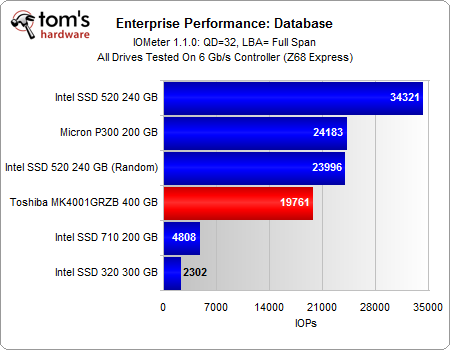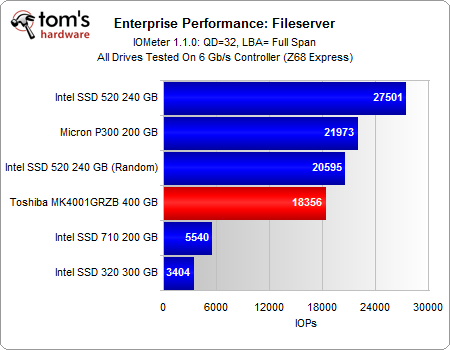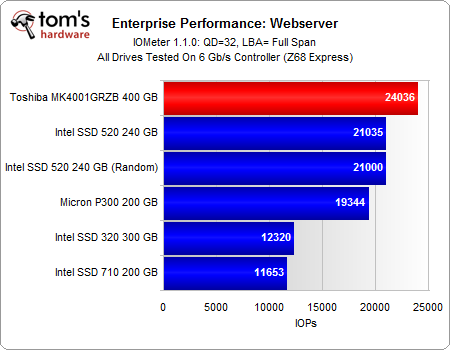Toshiba's $7000+ 400 GB SSD: SAS 6Gb/s, SLC Flash, And Big Endurance
Enterprise Workload Performance
Our last batch of synthetic tests subjects each SSD to the standard database, file server, and Web server profiles in Iometer.
Our Iometer database workload (also categorized as transaction processing) involves purely random I/O. Its profile consists of 67% reads and 33% writes using 8 KB transfers.
Despite the Toshiba drive's strong random performance, Intel's SSD 520 manages to jump into a compelling lead thanks to the compressibility of our data. Even if you hit it with incompressible information instead (the blue bar labeled Random), it still matches pace with Micron's P300, though. Interestingly, the MK4001GRZB falls behind, stymied by the mixed workload.
The file server test, which is also dominated by random I/O, is even more biased toward read operations. However, the gap separating Intel's SSD 520, Micron's P300, and Toshiba's MK4001GRZB is smaller.
The Web server profile consists completely of random reads. If you remember back to the first chart on page five, where Toshiba's drive absolutely dominated, we quickly come to understand why the MK4001GRZB jumps in front here as well. This is clearly an environment where Toshiba's enterprise SSD operates at its peak potential.
Get Tom's Hardware's best news and in-depth reviews, straight to your inbox.
Current page: Enterprise Workload Performance
Prev Page Power Consumption Next Page MK4001GRZB : Great Endurance, Fast Reads, Slower Writes-
compton Good job, Mr. Ku.Reply
Perhaps the Enterprise SSD Fairy will bring you a Hitatchi UltraStar with Intel's 6gbps controller. I'd be eager to see how it compares.
There is no substitute for SLC though. -
bennaye nebun$7000 any company willing to pay this much for an SSD is fullishReply
...fullish of cash? Definitely. Foolish? Probably not.
-
nebun bennaye...fullish of cash? Definitely. Foolish? Probably not.damn the english language.....there are way to many words that sound alikeReply -
nitrium Why is the 4KB Random read/write performance shown as IOPS, but 128KB and 2MB performance is in MB/sec? What speed (in MB/sec) does this drive achieve in 4KB? I guess I could calculate it from (IOPS * 4KB) / 1024 (I think that's right), but why should I have to?Reply -
spazoid amdfreakIt is too expensive for the performance it offers. You can get a RAID array of many Intel SSDs beating Toshiba in every segment.Reply
You've clearly not understood the purpose of this article. Stick to commenting the desktop drive reviews in the future, please.
Thank you for this review, and especially your estimations on the endurance of the drive. It's something that's damn near impossible for us IT professionals to get accurate estimations of in the real world. For some reason, bosses tend to want the expensive hardware to be put to use instead of being thoroughly tested.
More of these types of articles please! :] -
@spazoid, so you are telling me that you are willing to pay 10x for an endurance of 3x over the INTEL 520 SSD?Reply
Even when the INTEL SSD already has an endurance longer than your refresh cycle for your tech stack?
-
EJ257 frozonicLOL, i can just imagine myself in ten years telling my kids that we had to pay 7000$ for a 400gb ssd...by that time we are gonna have 400+ TB ssdsReply
"Back in my days storage drives used to have moving parts. Now its all solid state." -
jaquith I own a small data center and thankfully have access to a 'major' financial institutions test data, and I agree with your conclusions especially regarding deployment into production. $7K SSD is a tough call with a 5-year, but if it were 7~10-year then probably an easy call.Reply
Unlike super-sized enterprise which I am not, the cost/benefit calculations would be difficult for myself. I know firsthand the money that i.e. financial institutions push into their data centers, and for those folks $7K isn't out of the question.
Interesting SSD and if the prices come down and warranty extended then IMO it would be something to consider and compare against Intel's products.


